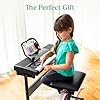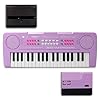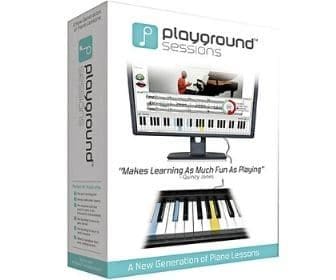Table of Contents
Introduction to Learning Piano Through Online Communities
Learning the piano can be a deeply rewarding and enriching experience. In recent years, the advent of the internet has transformed how we learn, providing access to a vast array of resources and community support through online platforms. This introductory guide explores the burgeoning world of learning piano in online communities, a trend that offers flexibility, diverse educational materials, and peer encouragement from around the globe. From forums and digital tutorials to interactive lessons and virtual real-time feedback, the online sphere opens numerous pathways to develop your piano playing skills.
Benefits of Joining Online Piano Forums and Groups
Online piano forums and groups offer a platform for learners from all levels to share experiences, discuss challenges, and provide support. They are invaluable for those seeking to enhance their learning, stay motivated through community involvement, and gain access to a wider variety of teaching materials and advice.
100 of the Most Beautiful Piano Solos Ever | Piano Sheet Music Book for Intermediate Players | Classical Pop and Jazz Standards | Essential Solo Repertoire for Adult Students Teachers and Pianists
28% OffP71 Digital Piano Review and Guide
$0.00 (as of December 20, 2025 15:53 GMT -08:00 - More infoProduct prices and availability are accurate as of the date/time indicated and are subject to change. Any price and availability information displayed on [relevant Amazon Site(s), as applicable] at the time of purchase will apply to the purchase of this product.)The Piano Proficiency Exam Review Book
$26.99 (as of December 20, 2025 19:57 GMT -08:00 - More infoProduct prices and availability are accurate as of the date/time indicated and are subject to change. Any price and availability information displayed on [relevant Amazon Site(s), as applicable] at the time of purchase will apply to the purchase of this product.)Ready for Theory Prep B Review Book (Ready for Theory Piano Review Books)
$10.95 (as of December 20, 2025 15:53 GMT -08:00 - More infoProduct prices and availability are accurate as of the date/time indicated and are subject to change. Any price and availability information displayed on [relevant Amazon Site(s), as applicable] at the time of purchase will apply to the purchase of this product.)Popular Online Piano Forums
Choosing the Right Piano Forum or Group
When selecting a forum, consider the activity level of the community, the quality of the discussions, and whether the content aligns with your specific learning goals. Look for active moderation, a friendly community, and the presence of experienced pianists who provide credible advice.
Maximizing Benefits from Online Piano Forums
To truly benefit from joining an online piano forum or group, actively participate in discussions, ask questions, and share your own experiences. Respectfully engage with other members, and take advantage of the wide array of resources and personal stories shared within the community.
Participating in Virtual Piano Recitals
Participating in virtual piano recitals has become a central activity within online piano communities, offering students the opportunity to showcase their skills and gain performance experience. Below are key aspects of participating in these online events:
To ensure a successful performance in a virtual recital, participants should focus on multiple aspects of preparation. This includes selecting the right repertoire that suits their skill level and the theme of the recital, if any. Adequate practice and perhaps even recording a few practice sessions can help in anticipating any performance issues. Additionally, understanding the technical requirements such as a stable internet connection, a good quality webcam, and optimal lighting and sound settings is crucial.
100 of the Most Beautiful Piano Solos Ever | Piano Sheet Music Book for Intermediate Players | Classical Pop and Jazz Standards | Essential Solo Repertoire for Adult Students Teachers and Pianists
28% OffP71 Digital Piano Review and Guide
$0.00 (as of December 20, 2025 15:53 GMT -08:00 - More infoProduct prices and availability are accurate as of the date/time indicated and are subject to change. Any price and availability information displayed on [relevant Amazon Site(s), as applicable] at the time of purchase will apply to the purchase of this product.)The Piano Proficiency Exam Review Book
$26.99 (as of December 20, 2025 19:57 GMT -08:00 - More infoProduct prices and availability are accurate as of the date/time indicated and are subject to change. Any price and availability information displayed on [relevant Amazon Site(s), as applicable] at the time of purchase will apply to the purchase of this product.)Ready for Theory Prep B Review Book (Ready for Theory Piano Review Books)
$10.95 (as of December 20, 2025 15:53 GMT -08:00 - More infoProduct prices and availability are accurate as of the date/time indicated and are subject to change. Any price and availability information displayed on [relevant Amazon Site(s), as applicable] at the time of purchase will apply to the purchase of this product.)The experience of performing in a virtual environment can differ significantly from live performances. Participants should be familiar with the software being used for the event, such as Zoom, Skype, or a dedicated concert platform. It’s also important to manage the sound settings to ensure the best audio quality reaches the audience. Engaging with the audience through a camera can feel different than facing a live audience, so finding ways to convey emotion and presence through the screen is essential.
In a virtual recital, feedback often takes a different form compared to traditional live recitals. Organizers might arrange for live comments, real-time applause simulations, or follow-up feedback sessions post-performance. Engaging positively with this feedback and interacting with other participants through chat functions or video can enrich the experience and foster a sense of community and improvement.
Virtual recitals often allow participants to reach a broader audience than local recitals. This exposure can be beneficial, especially for those looking to build a reputation or delve into professional realms. Performers might also have opportunities to be featured on community websites, social media platforms, or in online newsletters, amplifying their visibility in the piano-playing community.
Overall, participating in virtual piano recitals offered by online piano communities presents unique challenges and opportunities. With proper preparation and engagement, these virtual events can greatly enhance one’s learning experience, networking, and performance skills.
Sharing Your Progress for Constructive Feedback
One of the most effective ways to accelerate your learning process when studying piano through online communities is by sharing your progress for constructive feedback. This method not only allows you to understand your weaknesses and strengths but also helps you stay motivated through community support. Here are detailed ways to effectively share your progress:
Finding Piano Practice Partners Online
Locating piano practice partners online can enrich the learning experience and provide mutual support and motivation. Several platforms and strategies can help you connect with partners effectively:
When partnering up, ensure to set clear expectations regarding the times for practice sessions, objectives for what you wish to achieve together, and the communication tools (e.g., Zoom, Skype) that will be used for virtual meetings.
Exploring Online Piano Competitions
Online piano competitions have become a pivotal part of the musical landscape, offering pianists the opportunity to showcase their skills and compete without the need to travel. These competitions often provide valuable feedback from esteemed judges, and many feature notable prize offerings.
Variety of Competitions
There are numerous online piano competitions catering to different skill levels, ages, and musical preferences. These range from competitions focused on classical repertoire to those open to contemporary and jazz styles. The digital format allows for a wide participant base globally.
Accessibility and Convenience
One of the main advantages of online competitions is their accessibility. Participants can record their performances in their own space and at a convenient time. This flexibility is especially beneficial for those unable to travel or commit to the schedules of traditional competitions.
Feedback and Development
Participating in online competitions provides an invaluable opportunity for feedback. Competitors receive critique and advice from a panel of experienced musicians, which can be critical in their development. Feedback is often provided in detailed written formats, and sometimes video reviews.
Prizes and Recognition
While the nature of prizes can vary widely, most online piano competitions offer a range of awards from monetary prizes to scholarships or opportunities for further musical development. Recognition can also include invitations to participate in masterclasses or live concerts.
Community and Networking
Participants in online competitions often gain access to a community of peers and professionals. Many competitions facilitate this through forums, online seminars, and social media groups, allowing for networking opportunities and camaraderie among competitors.
Conclusion
Learning piano through online communities offers a flexible, diverse, and supportive environment for learners at all levels. Access to a wide range of resources, shared experiences, and the ease of receiving feedback significantly enhance the learning process. Leveraging these communities can lead to marked improvements in skills and sustained motivation over time. In essence, online communities have become indispensable tools for piano learners seeking to expand their knowledge and connect with like-minded individuals globally.






































